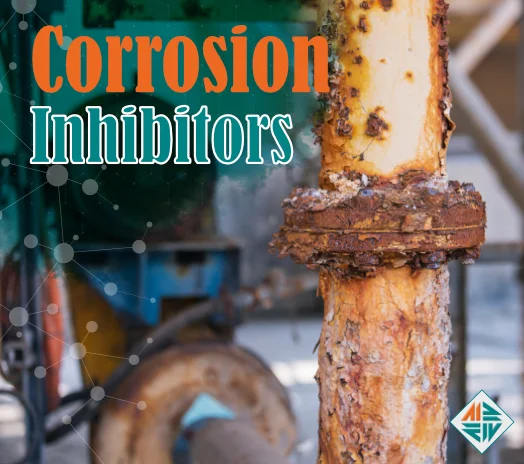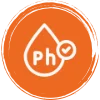Corrosion Inhibitors

Corrosion Inhibitors in India: Preserving Infrastructure and Industrial Assets
Maxwell Additives stands at the forefront, offering state-of-the-art Corrosion Inhibitors tailored for the Oil, Gas, and Refinery sectors. Our cutting-edge solutions are meticulously designed to protect your equipment and infrastructure from the corrosive challenges unique to oil refineries and gas processing plants.
With extensive industry expertise, we comprehend the nuances of these sectors, enabling us to engineer Corrosion Inhibitors that provide enduring safeguarding. Our inhibitors create a robust defense, forming protective barriers on metal surfaces, preventing rust, and reducing erosion. Whether you're engaged in upstream exploration, midstream transportation, or downstream refining, our specialized inhibitors are adept at countering corrosive environments. Maxwell Additives emphasizes sustainability, ensuring our inhibitors are highly effective and environmentally friendly, meeting regulatory standards.
By choosing us, you invest in cutting-edge technologies that enhance the longevity of your assets, bolster operational reliability, and significantly reduce maintenance costs. Partner with Maxwell Additives to optimize your oil, gas, and refinery processes, knowing your equipment is shielded against corrosion's detrimental effects.
INQUIRY NOWOur Product Range
Our Product Range
OLKLIN-CI-134C
Effective inhibitor for mitigating acid-induced corrosion.
CORIN-ACI-100
Corrosion inhibitor designed to combat acid corrosion in various industrial applications.
OLKLIN-CIQUA-924
Specially formulated inhibitor for corrosion protection during hydro testing processes.
OLKLIN-CIC-2000
Specifically designed inhibitor for corrosion control in close-circulating systems.
CORINFILM-101
Forms a protective film to prevent corrosion in diverse industrial settings.
OLKLIN-CIVES
Tailored corrosion inhibitor for systems using Variable Speed Drives (VES).
OLKLIN-INCI
Enhances the performance of corrosion inhibitors for more effective protection.
OLKLIN-OLCI
Specialized inhibitor for safeguarding oil lines against corrosion.
OLKLIN-GLCI
Designed to protect gas lines from corrosion, ensuring long-term integrity.
OLKLIN-CIVI-1
Targeted inhibitor to counteract vanadium-related corrosion in industrial processes.
OLKLIN-CIVI-2
Another variant designed for effective vanadium corrosion inhibition.
OLKLIN-CIVES
Tailored corrosion inhibitor for systems using Variable Speed Drives (VES).
IMPORTANCE
Functions of Corrosion Inhibitors

Prevention
Corrosion inhibitors protect metal surfaces, preventing corrosion and degradation caused by chemical reactions with the environment.

Surface Passivation
They form a protective layer on metal surfaces, inhibiting the reaction between the metal and corrosive substances, thus preserving the integrity of the material.

pH Stabilization
Corrosion inhibitors help maintain the pH balance of the environment, preventing acidic or alkaline conditions that can accelerate corrosion processes.

Selective Adsorption
They selectively adsorb onto metal surfaces, creating a barrier that hinders corrosive agents from coming into contact with the metal, effectively preventing corrosion.
Benifits of Corrosion Inhibitors
Prolonged Equipment Life
Corrosion inhibitors extend the lifespan of metal structures, reducing the need for frequent replacements.
Cost Efficiency
They cut maintenance costs significantly by preventing corrosion-related damage, saving on repairs and downtime expenses.
Improved Safety
Inhibitors prevent leaks and failures, enhancing operational safety and reducing the risk of accidents.
Environmental Protection
By preventing chemical spills, corrosion inhibitors help protect the environment, ensuring compliance with regulations and promoting eco-friendly practices.
Applications of Corrosion Inhibitors

Oil and Gas
Protects pipelines and drilling equipment, ensuring safe operations.

Refineries
Preserves critical components like distillation columns, ensuring optimal processes.

Power Plants
Guards boilers, turbines, and condensers, enhancing efficiency.

Aerospace
Prevents corrosion in aircraft components, ensuring safety and longevity.

Automotive
Shields radiators and engine parts, enhancing vehicle reliability.

Water Treatment
Protects pipes, ensuring delivery of clean, uncontaminated water.
Monitoring and Testing
At Maxwell Additives, the monitoring and testing process involves a comprehensive approach to quality assurance. Incoming raw materials undergo rigorous inspection, and throughout the manufacturing process, real-time monitoring ensures adherence to standard procedures.
Random samples of finished products are subjected to thorough laboratory testing, including chemical analysis and performance assessments, guaranteeing they meet specified criteria and comply with industry standards and regulations.
Additionally, products may undergo simulated real-world testing to assess their durability and reliability. Detailed documentation of all processes, along with continuous feedback analysis, allows for traceability, quality improvement, and the implementation of corrective measures, ensuring the production of high-quality, compliant products.

Regulations and Compliance
At Maxwell Additives, we understand the complexities of industry regulations and compliance standards. We proactively stay updated with the latest legal requirements and industry standards, relieving our clients from the burden of navigating intricate regulatory landscapes.
By entrusting us, businesses can focus on their core operations with confidence, knowing that our expertise ensures they remain in full compliance, promoting seamless operations and peace of mind.
FAQ's
When applied correctly, corrosion inhibitors do not significantly impact the mechanical properties of metals, allowing them to retain their strength and integrity.
Corrosion inhibitors find extensive use in industries such as oil and gas, automotive, aerospace, and water treatment, where metal structures are exposed to corrosive environments.
Yes, there are various types, including anodic inhibitors, cathodic inhibitors, and mixed inhibitors, each designed for specific types of corrosion and metal materials.
The effectiveness of a corrosion inhibitor depends on factors like environmental conditions and the inhibitor type. Regular monitoring and reapplication might be necessary to ensure continued protection.
Most corrosion inhibitors are formulated to be environmentally friendly. However, it's essential to choose inhibitors specifically labeled as eco-friendly to minimize environmental impact.
Yes, corrosion inhibitors are designed for use on both ferrous (iron-based) and non-ferrous metals (such as aluminum, copper, and alloys) to prevent corrosion.
Corrosion inhibitors are chemicals designed to prevent or reduce corrosion of metals. They work by forming a protective layer on metal surfaces, inhibiting the corrosion process.
Inhibitors are more effective when applied to clean surfaces. While they can offer some protection on mildly corroded surfaces, thorough cleaning and surface preparation are essential for optimal results.
Corrosion inhibitors can be applied through methods like spray, immersion, brushing, or incorporation into coatings and paints, chosen based on the specific requirements of the application and the inhibitor form.
Selecting the appropriate inhibitor involves considering factors such as the type of metal, the environment it's exposed to, and the specific corrosion challenges. Consulting with a corrosion expert or chemical engineer can help determine the most suitable inhibitor for your needs.
